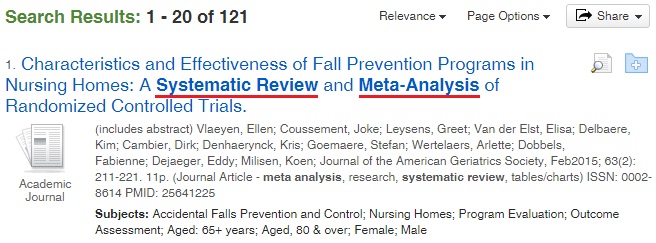Levels of Evidence

Levels of Evidence
Study Types
Meta Analysis
Similar to a systematic review, but uses a quantitative method to statistically combine the results of independent studies and synthesize their conclusions together, which may then be used to evaluate therapeutic effectiveness. These are considered the highest level of quality for evidence-based research.
Systematic Review
Uses explicit, rigorous methods to identify, critically appraise, and synthesize all relevant studies on a topic.
Randomized controlled trial
A clinical trial that involves at least one test treatment and one control treatment, concurrent enrollment and follow up of the test- and control-treated groups, and in which the treatments to be administered are selected by a random process.
Prospective, blind comparison to a gold standard
A controlled trial that compares a new diagnostic tool/test to what is currently considered the "goal standard."
Cohort Study
Study in which subsets of a defined population are identified and studies over a period of time to see the effects of something.
Case Control Studies
Study which starts with the identification of persons with a disease of interest and a control group without the disease. The relationship of an attribute to the disease is examined by comparing diseased and non-diseased persons with regard to the frequency or levels of the attribute in each group.
Case Series / Reports
Articles written about one patient or a series of patients with the same issue. Great for rare diseases, disorders, and drug/treatment reactions. Not the best source of evidence because it focuses on a small group of people, but sometimes it's the only source.
Rush University Medical Center Library. Evidence-Based Practice : Types of Evidence.
Which Study Type for Your Question?
Once your have your clinical question, you need to be able to recognize which type of studies are best suited to your type of question
If you're lucky enough to find a systematic review for your topic, then much of the work has already been done for you! However, you won't normally be that lucky. Outside of systematic reviews, here are some recommended study types for different clinical questions.
| Question | Type of Study |
|---|---|
| Therapy | RCT > cohort study > case control > case series |
| Diagnosis | Blind comparison to a gold standard |
| Harm / Etiology | RCT > cohort study > case series |
| Prognosis | Cohort study > case control > case series |
Finding the study type of an article
- Look in the title of the article

2. If the title doesn't specify, then check the abstract or subjects
3. Still unsure? Open the full text article and check the methods section.

- Last Updated: Apr 23, 2025 10:06 AM
- URL: https://jeghers.libguides.com/ebp
- Print Page